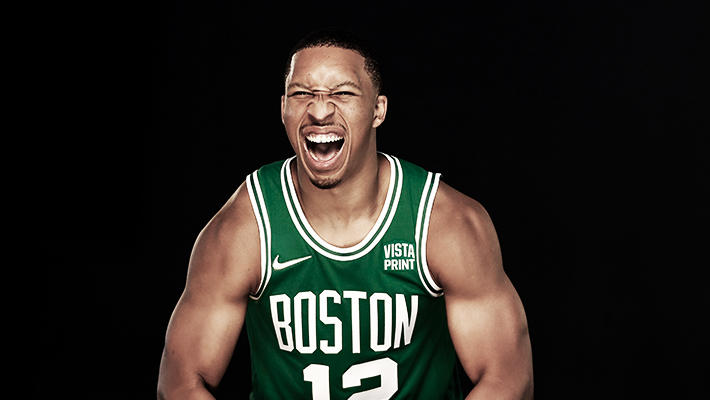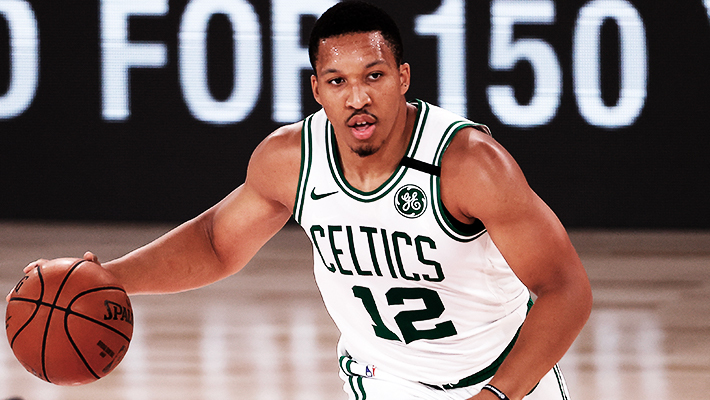BOSTON — Grant Williams is smiling. This isn’t exactly shocking, as Williams seems to have a smile permanently glued to his face, but on an early fall day during the NBA’s preseason, the Boston Celtics youngster’s good mood seems to be heightened over the topic of conversation at hand.
Williams, despite only having two years of being a professional basketball player under his belt, earned a leadership role within the National Basketball Players Association earlier in the year. The youngest member of the NBPA’s Executive Committee, Williams, who turns 23 at the end of November, slid into a Vice President role when Portland’s C.J. McCollum ascended to the presidency following Chris Paul’s decision to not seek a third term in the role.
It seemed like a foregone conclusion Williams would, eventually, get a role within the PA’s leadership. Upon getting to the NBA’s Rookie Transition Program, the former University of Tennessee standout and 22nd overall pick in the 2019 Draft was “very, very, let’s just say direct in my intention of saying I want to be involved.” Not long after, at the league’s winter meeting during the All-Star break, he applied for a VP role with the backing of Celtics teammate Jaylen Brown, who also serves on the Executive Committee — Williams lost out on a vote to Kyrie Irving.
“They could tell my energy and passion for it,” Williams says. “For me, it’s always been about trying to grow not just the game of basketball, but to bring our platform to a great use.”
This passion runs deep. Two of Williams’ cousins — Salim Stoudamire and current Celtics assistant Damon Stoudamire — spent time in the league, and he’s aware of how the money that comes from being a professional basketball player can change lives. Williams is a big fan of the PA’s financial literacy program as a result.
He’s also just a believer in what happens when a person takes the time to build relationships. For example, Williams likes to tell rookies that a basketball career is fleeting. The second that you decide to hang up your sneakers, someone is right behind you, ready to take your spot. You can, however, use your time as a player to set yourself up for later in life.
“I feel like the most potential you have in life, right now, is in your NBA career,” Williams says. “And oftentimes, we retire by 35, maybe earlier, 37. So those are the years that you create the most value and create the most lifelong relationships that you need to create. And I’ve always been vocal about using that platform to do that.”

This approach isn’t just something he takes with players. Williams takes pride in the amount of community service work he does, particularly with causes related to education and how kids can take what they learn and apply it to other things in life — a fairly close to home example, he mentions, is how getting a good grasp on geometry can translate to the basketball court by making it easier to read plays. A big believer in mentorship, Williams teamed up with the Massachusetts-based group MENTOR and has taken six Black high school freshmen under his wing. There are frequent calls that are designed to help guide them towards exploring whatever interest they might have.
“They each are different with what they believe in — whether it’s sport, whether it’s academics,” Williams says. “Just giving them guidance, because I feel like when you’re young, you’re the most impressionable, where you learn your work ethic and your drive, and when you’re able to really put yourself in a position for a better future. It starts when you’re at that age.”
Knowing Paul for his entire life and being teammates for his first two years with Kemba Walker helped hammer home the importance of giving back and mentorship, while playing alongside Brown and Enes Kanter gave him a glimpse at how basketball players can use their status in the game to pursue change off the court — both players, he notes, never hesitate to speak out in the face of injustice. As a third-year player, Williams is still building up relationships around the league, but he does want to motivate guys to advocate for causes they’re passionate about.
“We all have similar interests, and we all have similar goals that make life better, not only for ourselves, but for those around us,” Williams says. “And I always say paying it forward, paying it back, whatever you want to say, is the best way to do those things because it helps make the future brighter.”
When it comes to his work with the PA, Williams is a firm believer in the strength that the union has as a collective. The competitive nature that basketball players have exists between the lines, of course, but when they are operating as one big 450 person organization, the power that they wield can make incredible things happen.
Yes, when the Celtics are playing host to the Los Angeles Lakers, the rivalry that has come to define the game over the years is going to be as competitive as ever. Off the court, though, Williams knows more harm than good would come if those tensions lingered. He compares it to the 1990s when Michael Jordan and Charles Barkley would battle and then go play golf. While their matchups would pit two of the best players in the world against one another, oftentimes in hotly-contested games, they understood the value of having a relationship off the court, because, as Williams says, “no one else understands the position that we’re in” as NBA players.
Williams is entering the PA as the league and the union approach an important moment: the negotiation of a new collective bargaining agreement. The current CBA is set to expire at the conclusion of the 2023-24 season, although both sides can agree to opt out one year earlier. As an added twist, while McCollum is the PA’s newly-elected President, Tamika Tremaglio is slated to take over for longtime Executive Director Michele Roberts at the end of this year.

All of this is happening after what Williams calls “probably the most unique [two] years in the league’s history” due to the COVID-19 pandemic, players heading down to the Orlando Bubble, and the growing commitment to social justice that sprung out of players causing the league to come to a stop after a police officer in Wisconsin shot Jacob Blake. That last thing, in particular, was instructive for Williams, a then-rookie who saw first-hand the power that exists in the hands of players when they operate as a collective.
“I think that’s really what shifted the change, as well as seeing the dynamics,” Williams says. “For me, it’s always been about shifting the power balance and making it more of a whole rather than a top-to-bottom hierarchy. So, like I said, rookies have just as much of a voice as a veteran does. And that’s something that, as time has gone on, players have been more open to, especially as the talent has gotten better as years have gone on. Guys aren’t normally like Jayson Tatum and Jaylen Brown, there’s not normally a few of those guys on the single team. There’s a lot of youth that are really growing together. So, I think that’s the real step that we’re making with the PA, bringing everyone’s voice and making sure that everyone knows that they have a role.”
This sort of egalitarian approach to advocating for basketball players is something Williams takes to heart. On multiple occasions during our conversation, he referenced the fact that there are 450 players in the league, and each and every one of them needs to feel empowered to let their voices be heard as part of the union, whether that’s related to the upcoming CBA, its ongoing commitment to social justice — Williams has been appreciative of the work the recently-formed Social Justice Coalition has done under Executive Director James Cadogan to raise awareness for issues like voting rights and education disparities — or anything else.
He used the phrase “think 450” in reference to how he wants the Players Association to operate, and believes that it’s possible for the organization to take care of superstars while simultaneously fighting for those who are a little farther down the roster.
“You look at what we’re doing with the G League union, with all these steps that we’re taking to not only make sure that the players at the top are doing well, but also the players throughout the league,” Williams says. “As the league grows, not only will the checks — for LeBron, Steph, all those names — get better, but also, for the guys who are the 15th player on the bench, and allows them to create generational wealth for not only themselves, but the communities they’ve been in. So, I feel like that’s the process we’re getting to, especially as the league has grown and expanded as the years have gone on. And I’m happy to see that.”
Of course, Williams has some pretty important work to do away from the PA, as he’s among the options new Celtics coach Ime Udoka can turn to in the frontcourt. It’s been a hectic offseason in Boston — longtime executive Danny Ainge abdicated his post, he was replaced by now-former head coach Brad Stevens, and Udoka took over on the bench. But Williams feels pretty good about it all, because in spite of all this, there’s a major sense of familiarity around the team.
“There’s been a little bit of roster turnover, as well as organizational turnover, but I feel like there’s still a lot of familiar faces,” Williams says. “And it’s something that, looking on it now, we have guys who came back to the team like Al [Horford], familiar with the team, Enes, familiar with the team. And then we have faces that we have prior relationships with. I’ve know Josh [Richardson] since I was in college. So, it’s one of those things where you feel like you can grow, as well as have players who are still around.”
He is of the belief that teams that had lengthy stays in the NBA’s Orlando Bubble were just a little bit off last season, which applied to the Celtics — the squad struggled with COVID en route to a 36-36 campaign, a seventh seed in the Eastern Conference, and a five-game gentleman’s sweep to the Brooklyn Nets in the first round of the postseason. But on the heels of this offseason, he says, it has felt like a “breath of fresh air” has come through Beantown, as guys have come back hungry and ready to compete for the 18th championship in franchise history.
For Williams, the goals are to become a more consistent compliment to Tatum and Brown while getting his body right. As a rookie, he bulked up, as the expectation was he’d play the 5. That changed during his second year in the league, as he slid down to the 4. He’s used this offseason to try to find that right balance between the two, making sure he’s at a place physically where he can do whatever the Celtics ask.
And more broadly, Williams admits he had some struggles during his second year in the league. He thought there were plenty of highs, but on the other side of the coin, there were “not so great moments” where he “tried to do too much.” With a new year on the horizon, Williams sees an opportunity to get things back on track.
“I feel like COVID kind of knocked a lot of people down last year, I could see it with the energy and a lot of the faces,” Williams says. “The breath of fresh air kind of gives new light, and kind of bring brings a smile back to your face.”







